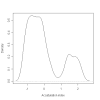Correlates of depressive symptoms among Latino and Non-Latino White adolescents: findings from the 2003 California Health Interview Survey
- PMID: 17313675
- PMCID: PMC1805430
- DOI: 10.1186/1471-2458-7-21
Correlates of depressive symptoms among Latino and Non-Latino White adolescents: findings from the 2003 California Health Interview Survey
Abstract
Background: The prevalence of depression is increasing not only among adults, but also among adolescents. Several risk factors for depression in youth have been identified, including female gender, increasing age, lower socio-economic status, and Latino ethnic background. The literature is divided regarding the role of acculturation as risk factor among Latino youth. We analyzed the correlates of depressive symptoms among Latino and Non-Latino White adolescents residing in California with a special focus on acculturation.
Methods: We performed an analysis of the adolescent sample of the 2003 California Health Interview Survey, which included 3,196 telephone-interviews with Latino and Non-Latino White adolescents between the ages of 12 and 17. Depressive symptomatology was measured with a reduced version of the Center for Epidemiologic Studies Depression Scale. Acculturation was measured by a score based on language in which the interview was conducted, language(s) spoken at home, place of birth, number of years lived in the United States, and citizenship status of the adolescent and both of his/her parents, using canonical principal component analysis. Other variables used in the analysis were: support provided by adults at school and at home, age of the adolescent, gender, socio-economic status, and household type (two parent or one parent household).
Results: Unadjusted analysis suggested that the risk of depressive symptoms was twice as high among Latinos as compared to Non-Latino Whites (10.5% versus 5.5 %, p < 0.001). The risk was slightly higher in the low acculturation group than in the high acculturation group (13.1% versus 9.7%, p = 0.12). Similarly, low acculturation was associated with an increased risk of depressive symptoms in multivariate analysis within the Latino subsample (OR 1.54, CI 0.97-2.44, p = 0.07). Latino ethnicity emerged as risk factor for depressive symptoms among the strata with higher income and high support at home and at school. In the disadvantaged subgroups (higher poverty, low support at home and at school) Non-Latino Whites and Latinos had a similar risk of depressive symptoms.
Conclusion: Our findings suggest that the differences in depressive symptoms between Non-Latino Whites and Latino adolescents disappear at least in some strata after adjusting for socio-demographic and social support variables.
Figures
Similar articles
-
Bicultural stress and adolescent risk behaviors in a community sample of Latinos and non-Latino European Americans.Ethn Health. 2007 Nov;12(5):443-63. doi: 10.1080/13557850701616854. Ethn Health. 2007. PMID: 17978943
-
Adolescent participation in preventive health behaviors, physical activity, and nutrition: differences across immigrant generations for Asians and Latinos compared with Whites.Am J Public Health. 2007 Feb;97(2):337-43. doi: 10.2105/AJPH.2005.076810. Epub 2006 Nov 30. Am J Public Health. 2007. PMID: 17138919 Free PMC article.
-
Dietary intakes of preschool-aged children in relation to caregivers' race/ethnicity, acculturation, and demographic characteristics: results from the 2007 California Health Interview Survey.Matern Child Health J. 2012 Dec;16(9):1844-53. doi: 10.1007/s10995-011-0931-5. Matern Child Health J. 2012. PMID: 22160613
-
Cultural Stressors and Depressive Symptoms in Latino/a Adolescents: An Integrative Review.J Am Psychiatr Nurses Assoc. 2019 Jan/Feb;25(1):49-65. doi: 10.1177/1078390318778885. Epub 2018 Jun 4. J Am Psychiatr Nurses Assoc. 2019. PMID: 29862864 Free PMC article. Review.
-
A longitudinal study of Latino and non-Hispanic mothers' and fathers' depressive symptoms and its association with parent-child communication.J Affect Disord. 2018 Feb;227:580-587. doi: 10.1016/j.jad.2017.10.046. Epub 2017 Oct 31. J Affect Disord. 2018. PMID: 29172050 Free PMC article. Review.
Cited by
-
Pregnant adolescent women's perceptions of depression and psychiatric services in the United States.Women Birth. 2017 Oct;30(5):e248-e257. doi: 10.1016/j.wombi.2017.02.006. Epub 2017 Mar 18. Women Birth. 2017. PMID: 28330583 Free PMC article.
-
Complementary and alternative medicine therapies to promote healthy moods.Pediatr Clin North Am. 2007 Dec;54(6):901-26; x. doi: 10.1016/j.pcl.2007.09.002. Pediatr Clin North Am. 2007. PMID: 18061783 Free PMC article. Review.
-
Is greater acculturation associated with an increased prevalence of cardiovascular risk factors among Latinos in South Florida?Med Care. 2015 May;53(5):417-22. doi: 10.1097/MLR.0000000000000337. Med Care. 2015. PMID: 25793266 Free PMC article.
-
Migrant adolescents' experience of depression as they, their parents, and their health-care professionals describe it: a systematic review and qualitative meta-synthesis.Eur Child Adolesc Psychiatry. 2024 Jan;33(1):1-19. doi: 10.1007/s00787-022-01971-2. Epub 2022 Mar 17. Eur Child Adolesc Psychiatry. 2024. PMID: 35301589
-
Contextual amplification or attenuation of pubertal timing effects on depressive symptoms among Mexican American girls.J Adolesc Health. 2012 Jun;50(6):565-71. doi: 10.1016/j.jadohealth.2011.10.006. Epub 2012 Feb 3. J Adolesc Health. 2012. PMID: 22626482 Free PMC article.
References
-
- Üstün TB, Chatterji S. Global Burden of Depressive Disorders and Future Projections. In: Dawson A, Tylee A, editor. Depression: Social and Economic Timebomb. London , BMJ Books ; 2001.
-
- U.S. Department of Health and Human Services Mental Health . A Report of the Surgeon General. Rockville, MD , U.S. Department of Health and Human Services, Substance Abuse and Mental Health Services Administration, Center for Mental Health Services, National Institutes of Health, National Institute of Mental Health; 1999.


